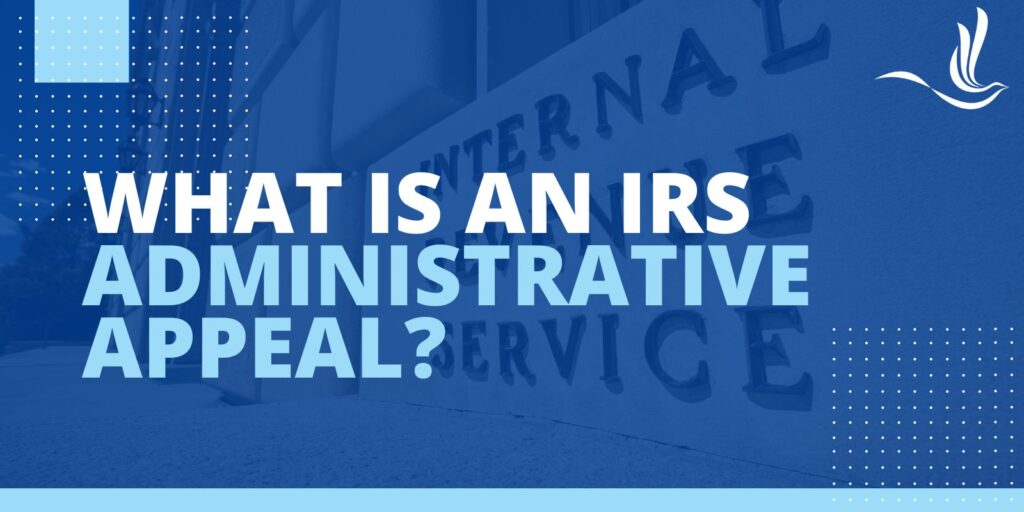If you’ve been hit with an assessment from the IRS and you disagree with the results, you are entitled to present your case in Tax Court. However, an IRS administrative appeal may produce desirable results without the need to go to court. As a taxpayer, you are entitled to dispute the results of an IRS assessment through the administrative appeal process for any reason other than religious, moral or political, conscientious objections. The professionals at Optima Tax Relief can determine whether an administrative appeal is the right course for your situation. The IRS administrative appeals process can be an effective way to handle disagreements over tax assessments, penalties, or other IRS decisions, offering a less formal and often less costly alternative to litigation. Here’s an overview of IRS administrative appeals, including the types, how each works, and important things to note before requesting one.
IRS Administrative Appeal Categories
The IRS Appeals division operates as a separate entity from IRS offices that conduct investigations. The two types of administrative appeals available are Collections Appeal Process (CAP) or Collections Due Process (CDP) hearings. Administrative appeal hearings may be conducted by mail, telephone or in person. You may represent yourself or be represented by a CPA, attorney or enrolled agent authorized to practice before the IRS. If your tax return was prepared by a third party not enrolled with the IRS, they may be a witness but may not represent you.
Collection Appeals
Collection Appeals involve disputes over IRS collection actions. These actions can include levies, liens, seizures, and other methods the IRS uses to collect outstanding taxes. To break this down even further, there are two main programs under Collection Appeals: Collection Due Process (CDP) and the Collection Appeals Program (CAP).
Collection Due Process
The CDP program allows taxpayers to appeal collection actions before they occur, providing a forum to address issues related to the collection process. Taxpayers who receive certain IRS notices can request a CDP hearing. These include the Notice of Federal Tax Lien Filing, Final Notice of Intent to Levy, Notice of Jeopardy Levy, Notice of Levy on a State Tax Refund, or Post Levy Collection Due Process Notice
Taxpayers generally have 30 days from the date of the notice to request a CDP hearing. They can do so via Form 12153, Request for a Collection Due Process or Equivalent Hearing. If the taxpayer disagrees with the CDP determination, they have the right to seek judicial review in the U.S. Tax Court. After 30 days, you may request an Equivalent Hearing within one year. However, collection activities will not be suspended. In addition, you cannot appeal the results in Tax Court.
Collection Appeals Program
The CAP provides a faster and more streamlined process than CDP, but it does not offer the same judicial review rights. Taxpayers can request a CAP hearing at any time, even before or after a collection action has been taken. For example, a CAP filed to protest a wrongful levy may be filed either before or after property has been seized. However, it must be filed before the property is sold. A CAP can be used to address the following IRS actions:
- Prior to or after the filing of a Notice of Federal Tax Lien
- Prior to or after levy or seizure of property by the IRS
- Proposed or actual termination of an installment agreement
- Rejection or modification of an installment agreement
- Rejected taxpayer request to return to levied property
- Seizure
It’s crucial to note that you will not be able to take your case to Tax Court if you disagree with the conclusions of the CAP. You must file Form 9423, Collection Appeal Request to initiate a CAP review.
Submitting Your Request for Administrative Review
If you’re audited and your auditor finds that you owe less than $2,500, you may approach them about an appeal directly or submit your request through the appeals system. If you owe between $2,500 and $25,000, you should submit a Small Case Request. Alternatively, you can use Form 12203, Request for Appeals Review, which can be found on the IRS website. Assessments of $25,000 or more require a Formal Written Protest using Form 12202, including the following items.
- Your name, address, and a daytime telephone number.
- A statement of intent to appeal the IRS findings to the Office of Appeals.
- A copy of the letter showing the proposed assessment.
- The tax period(s) or year(s) involved.
- A detailed description of each item with which you disagree.
- The reason(s) for your disagreement for each item.
- Facts supporting your position for each item.
- Any law or legal authority that supports your position on each item.
- The following penalties of perjury statement stated exactly: “Under the penalties of perjury, I declare that the facts stated in this protest and any accompanying documents are true, correct, and complete to the best of my knowledge and belief.”
- Your signature beneath the penalties of perjury statement.
If your request for appeal is prepared by your representative, he or she must substitute the declaration for penalties of perjury statement for individual taxpayers with a statement that includes each of the following elements:
- An affirmation that he or she submitted the protest and any accompanying documents, AND
- A statement of personal knowledge of stated facts in the protest and accompanying documents and a declaration that the facts are true and correct.
The Administrative Hearing Process
After submitting your request for administrative review, you generally have at least 60 days to prepare for the hearing. Draft a rough outline of the information you wish to include in your presentation. Categorize any other relevant information in spreadsheets or in visual displays, with separate folders for each item.
It’s wise to request a copy of the auditor’s file under the Freedom of Information Act (FOIA) immediately. FOIA requests can take at least a month to process. The letter should cover all relevant tax years and provide an offer to cover copying costs. Send the letter by certified mail or other traceable means.
The hearing itself will be fairly informal. You are entitled to take notes or record the hearing if you wish. Be prepared for requests for further information. If that happens, don’t hesitate to ask for more time.
If you reach a verbal settlement during the hearing, the settlement will be transcribed onto IRS Form 870, Waiver of Restrictions on Assessment and Collection of Deficiency in Tax and Acceptance of Overassessment. Keep in mind, however, that this form can take months to arrive in the mail. Double check all the figures and do not sign the form unless you understand and agree with everything contained within it. Likewise, do not sign the form if you’ve found other mistakes from the auditor or appeals officer. Once you sign the form, you are barred from making further appeal to the Tax Court.
Tax Help for Those Who Owe
The IRS Administrative Appeal process is a valuable tool for taxpayers seeking to resolve disputes in a fair, impartial, and cost-effective manner. By understanding the steps involved and preparing adequately, taxpayers can go through the appeal process and potentially reach a resolution without the need for tax court. If you find yourself in disagreement with an IRS decision, considering an administrative appeal can be a prudent first step. If you’re unsure, consulting a tax professional can be helpful. Optima Tax Relief is the nation’s leading tax resolution firm with over $3 billion in resolved tax liabilities.
If You Need Tax Help, Contact Us Today for a Free Consultation
Publisher: Source link











